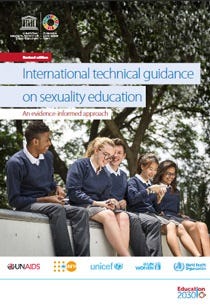Curriculum Engineers Are Are Messing With Children's Heads
They Aim To Turn Schools Into Factories of Indoctrination
One of the most disturbing developments in western societies is the alarming speed with which the school curriculum has become a vehicle for promoting political objectives and transforming children's values, attitudes and sensibilities.
The education system is increasingly devoted to the project of what I characterise as socialisation-in-reverse. In my book, Wasted: Why Education Is Not Educating, I pointed out that many educators believe that their role is not to socialise young people to embrace the values of their parents and communities but to undermine them and replace them with what they take to be progressive ones. This approach was outlined in 1922 by John Dewey, arguably the most influential progressive educator of the last century, in the following terms:
‘It is the business of the school environment to eliminate, so far as possible, the unworthy features of the existing environment…As a society becomes more enlightened, it realizes that it is responsible not to transmit and conserve the whole of its existing arrangements, but only such as make for a better future society. The school is its chief agency for the accomplishment of this end’.
In practice, what Dewey meant by ‘unworthy features of the existing environment’ referred to many of the traditional norms that prevailed in American communities. In effect, Dewey called into question the relevance of values underpinning the outlook of the community that children inhabited. Instead, he proposed that schools should teach children the values that he and his colleagues upheld, even if they conflicted with the views of their parents.
Since Dewey’s time, proponents of socialisation-in-reverse have become more aggressive in pursuing their project. They argue that they should possess a central role in young people's socialisation because parents cannot perform their role effectively.
Brock Chisholm, the Canadian psychiatrist and the first Director General of the World Health Organisation (WHO), clearly outlined this ambition. In 1948, Chisholm wrote, 'a new kind of citizen is necessary if the human race is going to survive’. He added that a citizen’s loyalty ‘should not stop at anything short of world loyalty’. From Chisholm’s globalist perspective, people had to be detached from their narrow national loyalties and re-socialised as supposedly enlightened citizens of the world. It was up to experts and teachers to save children from their parents.
Chisholm also believed that people had to be re-educated to reject their old-fashioned moral norms. He took exception to a moral outlook that relied on the ‘concept of right and wrong’ as the basis of child training. He concluded that ‘the fact is, that most psychiatrists and psychologists and other respectable people have escaped from these moral chains and are able to observe and think freely’. Chisholm’s rejection of the distinction between right and wrong has been thoroughly internalised by Anglo-American pedagogy. Accordingly, children are taught to be non-judgmental. Within the system of education, non-judgementalism is regarded as a foundational value.
Since the mid-1990s, the implicit questioning of the ability of parents to socialise their children has become increasingly strident. As a result, there has been a gradual shift in how experts portray the uneasy partnership between family and school. Educationalists often assume that poor parenting and the fragmentation of the family is a fact of life that necessitates that schools assume responsibility for forms of socialisation that were hitherto carried out in the home.
Every society needs to transmit ideas about the conduct of life and the ideals it upholds. Previously, such ideals were communicated through an inter-generational conversation about the norms of moral behaviour. In recent times policymakers and educators have sought to bypass the problem of the inter-generational transmission of values by attempting to use schools to socialise children into values elaborated by experts and pedagogues directly. The adoption of this approach has important implications for inter-generational relations. While teaching children the latest enlightened ‘value’, pupils learn that these views are superior to the antiquated sentiments held by their parents. Socialisation-in-reverse undermines not only parental authority but also estranges young and old from one another.
In effect, socialisation-in-reverse turns education into social engineering. This form of social engineering has acquired unprecedented momentum in the past decade. Under the guise of promoting equality and inclusion, schools have taken it upon themselves to challenge the foundational values of western culture forcefully. Children are indoctrinated to despise their society’s history. They are made to feel guilty about their white privilege if they are white. Worse still, they are taught that gender trumps sex and that, therefore, they should not take their biological sex as girls and boys too seriously.
Recently, I encountered numerous parents who have realised that their children have become targets of indoctrination in their classrooms. Many of them believe that the source of this problem is a zealous teacher or a particular school run by a campaigning headteacher. They don’t realise that indoctrination has acquired a systemic character and that some very powerful institutions are orchestrating it.
Sex Education Turned Into A Celebration Of Gender Fluidity
Take the institutionalisation of the ideology of transgenderism. Social observers and commentators have widely noted the rapid spread of this ideology amongst the young. The global diffusion of this ideology should not come as a surprise since powerful international organisations have devoted considerable resources to ensure that transgenderism gains influence amongst school children. The principal medium for spreading this ideology is sex education, which has been rebranded as sexuality education. Unlike sex education, which is principally about sex, sexuality education is about promoting the cultural politics of identity. This approach is aggressively promoted by a coalition of international organisations, such as WHO, the United Nations Population Fund, the United Nations Children’s Fund and UNESCO.
These organisations have produced a curriculum for schools throughout the world. It is titled; International technical guidance on sexuality education: An evidence informed approach. Don’t be fooled by the technical framing of this document. Despite its claim to be an ‘evidence-based approach’, this a thoroughly ideological document. The curriculum it offers shifts attention from the traditional focus on biological sex to gender identity. It seeks to influence children to be open to the idea that what matters is their ‘sexuality’, that is, their gender identity rather than their biological sex.
The document’s definition of gender identity is instructive. It states:
‘Gender identity: a person’s deeply felt internal and individual experience of gender, which may or may not correspond with the sex assigned to them at birth. This includes the personal sense of the body which may involve, if freely chosen, modification of bodily appearance or function (by medical, surgical or other means).
According to the outlook communicated by this definition, gender identity logically trumps biological sex. The integrity of the concept of biological sex is diminished by referring to it as something that is ‘assigned to them at birth’. Unlike gender identity, which is freely chosen, sex is assigned by others and is, therefore, of less significance to the life of the children sitting in the classroom.
Following the approach of Chisholm and WHO, the document International technical guidance on sexuality education is wholly committed to the project of socialisation-in-reverse. The curriculum calls into question the relevance of the values upheld by Parents. In a section titled ‘Values and sexuality’, it highlights what it calls the ‘Key idea’, which turns out to be the following:
‘As children grow up, they develop their own values which may differ from their parents/guardians’.
Teaching this ‘key idea’ can have only one purpose: to undermine the salience of the values held by parents and to dimmish their authority. The learning outcomes expected of pupils studying ‘Values and Sexuality’ are outlined in the following terms:
Learners will be able to:
▶▶ differentiate between values that they hold, and
that their parents/guardians hold about sexuality
(knowledge);
▶▶ acknowledge that some of their values may be different
from their parents/guardians (attitudinal);
▶▶ demonstrate ways to resolve conflict with family
members due to differing values (skill).
In effect, children are implicitly encouraged to regard the values held by their parents about sexual matters as a fact of life. They are encouraged to consider themselves as the adults in the room who possess the skill to ‘resolve conflict with family members due to differing values’. Having been socialised to view their gender as fluid, children are tasked with re-socialising their parents.
This curriculum fails to acknowledge how children acquire values that are so different from those of their parents. These values did not arise spontaneously in children’s minds; they were acquired through exposure to sexuality educators. WHO’s curriculum engineers dishonestly fail to acknowledge their role in socialising children to internalise values that are expressly different to those of their parents.
It is entirely legitimate to teach values in schools but not to encourage children to adopt values that are antithetical to those of their parents. If teachers use political propaganda to influence children, they violate a foundational principle of childhood pedagogy – their personal agenda trumps the educational needs of pupils.
The promotion of this ideology is particularly reprehensible in primary education, where politically active teachers seek to influence those in their charge. Sexuality educators target even children as young as 6 and 7. For example, in the UK primary school system, children are often taught not to take for granted their gender identity. The trans-genderist campaign group Stonewall, whose School and College Champions Scheme provides guidance to Primary Schools, states that
‘Everyone has a gender identity. This is the gender that someone feels they are. This might be the same as the gender they were given as a baby, but it might not. They might feel like they are a different gender, or they might not feel like a boy or a girl’.
As it happens, babies are not ‘given’ a gender. They are presumed to belong to one or another biological sex. The suggestion that children might not feel that they are a boy or a girl is designed to encourage them to question their identity rooted in biological sex. By encouraging primary school children to cultivate doubts about their biological self, youngsters are indoctrinated into the ideology of transgenderism. Trans-genderist campaigners are far more interested in influencing the outlook of young children than in helping them to gain confidence about who they are.
Sexuality education aims to indoctrinate rather than to educate. Its curriculum is designed to influence children’s perception of who they are rather than provide them with what they really need- disciplinary knowledge
In this essay, I only dealt with one form of indoctrination – the promotion of transgenderism through sexuality education. However, indoctrination takes many other forms. In future posts, I will explain how children are taught to be wary of their history and community and to regard the legacy of western civilisation as shameful.





![Wasted: Why Education Isn't Educating by [Frank Furedi] Wasted: Why Education Isn't Educating by [Frank Furedi]](https://substackcdn.com/image/fetch/$s_!hD-l!,w_1456,c_limit,f_auto,q_auto:good,fl_progressive:steep/https%3A%2F%2Fsubstack-post-media.s3.amazonaws.com%2Fpublic%2Fimages%2Fa03b9b2d-2667-4637-8671-49eea7f3c2e9_319x500.jpeg)


I tend to agree with you
Thanks Frank. This content on schools is vital.The education system is being subverted quite often by "useful idiots" within the system who fondly believe they are "making the world a better place." Its an insidious and dangerous aspect of the culture war that is currently underway.